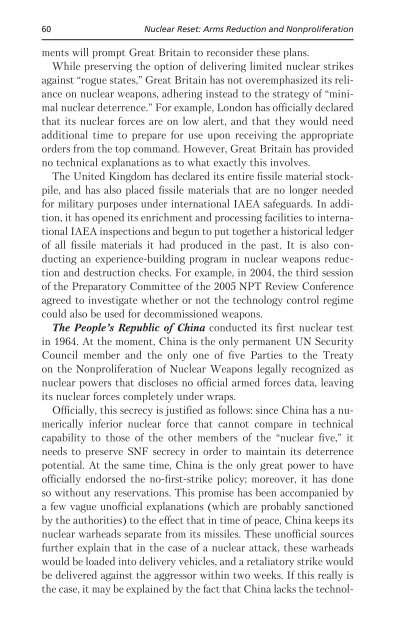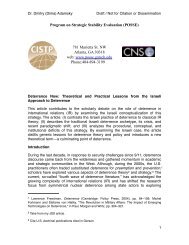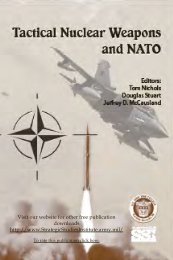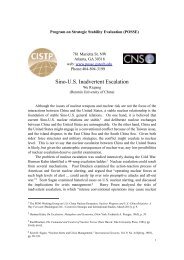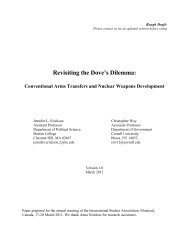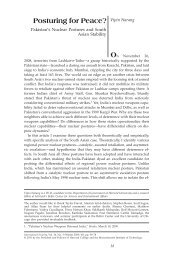- Page 4 and 5:
c a r n e g i e m o s c o w c e n t
- Page 7 and 8:
Chapter 11. The Threat of Accidenta
- Page 10: AcknowledgementsThe authors wish to
- Page 24: Part IPost-Cold WarNuclear<
- Page 27 and 28: 26Nuclear
- Page 29 and 30: 28Nuclear
- Page 31 and 32: 30Nuclear
- Page 33 and 34: 32Nuclear
- Page 35 and 36: 34Nuclear
- Page 37 and 38: 36Nuclear
- Page 41 and 42: 40Nuclear
- Page 43 and 44: 42Nuclear
- Page 45 and 46: 44Nuclear
- Page 47 and 48: 46Nuclear
- Page 49 and 50: 48Nuclear
- Page 51 and 52: 50Nuclear
- Page 53 and 54: 52Nuclear
- Page 55 and 56: 54Nuclear
- Page 57 and 58: 56Nuclear
- Page 59: 58Nuclear
- Page 63 and 64: 62Nuclear
- Page 65 and 66: 64Nuclear
- Page 67 and 68: 66Nuclear
- Page 69 and 70: 68Nuclear
- Page 71 and 72: 70Nuclear
- Page 73 and 74: 72Nuclear
- Page 75 and 76: 74Nuclear
- Page 78 and 79: C h a p t e r 3Nuclear</str
- Page 80 and 81: Chapter 3. Nuclear
- Page 82 and 83: Chapter 3. Nuclear
- Page 84 and 85: Chapter 3. Nuclear
- Page 86 and 87: Chapter 3. Nuclear
- Page 88 and 89: Chapter 4. The Iranian Problem87In
- Page 90 and 91: Chapter 4. The Iranian Problem89rep
- Page 92 and 93: Chapter 4. The Iranian Problem91tor
- Page 94 and 95: Chapter 4. The Iranian Problem93dia
- Page 96 and 97: Chapter 4. The Iranian Problem95ado
- Page 98 and 99: Chapter 4. The Iranian Problem97On
- Page 100 and 101: Chapter 4. The Iranian Problem99num
- Page 102 and 103: Chapter 4. The Iranian Problem10129
- Page 104 and 105: C h a p t e r 5The North KoreanPrec
- Page 106 and 107: Chapter 5. The North Korean Precede
- Page 108 and 109: Chapter 5. The North Korean Precede
- Page 110 and 111:
Chapter 5. The North Korean Precede
- Page 112 and 113:
Chapter 5. The North Korean Precede
- Page 114 and 115:
Chapter 5. The North Korean Precede
- Page 116 and 117:
Chapter 5. The North Korean Precede
- Page 118 and 119:
C h a p t e r 6The South Asian Stan
- Page 120 and 121:
Chapter 6. The South Asian Standoff
- Page 122 and 123:
Chapter 6. The South Asian Standoff
- Page 124 and 125:
Chapter 6. The South Asian Standoff
- Page 126 and 127:
Chapter 6. The South Asian Standoff
- Page 128 and 129:
Chapter 6. The South Asian Standoff
- Page 130 and 131:
Chapter 6. The South Asian Standoff
- Page 132 and 133:
Chapter 6. The South Asian Standoff
- Page 134 and 135:
Chapter 6. The South Asian Standoff
- Page 136 and 137:
Chapter 6. The South Asian Standoff
- Page 138 and 139:
Chapter 6. The South Asian Standoff
- Page 140 and 141:
Chapter 6. The South Asian Standoff
- Page 142 and 143:
Chapter 6. The South Asian Standoff
- Page 144 and 145:
C h a p t e r 7Missile TechnologySe
- Page 146 and 147:
Chapter 7. Missile Technology145in
- Page 148 and 149:
Chapter 7. Missile Technology147Ira
- Page 150 and 151:
Chapter 7. Missile Technology149der
- Page 152 and 153:
Chapter 7. Missile Technology151Ove
- Page 154 and 155:
Chapter 7. Missile Technology153pre
- Page 156 and 157:
Chapter 7. Missile Technology155bus
- Page 158 and 159:
Chapter 7. Missile Technology157Nor
- Page 160 and 161:
Chapter 7. Missile Technology1594 R
- Page 162 and 163:
Chapter 8. Nuclear
- Page 164 and 165:
Chapter 8. Nuclear
- Page 166 and 167:
Chapter 8. Nuclear
- Page 168 and 169:
Chapter 8. Nuclear
- Page 170 and 171:
Chapter 8. Nuclear
- Page 172 and 173:
Chapter 8. Nuclear
- Page 174:
Chapter 8. Nuclear
- Page 178 and 179:
C h a p t e r 9Strategic Offensive
- Page 180 and 181:
Chapter 9. Strategic Offensive and
- Page 182 and 183:
Chapter 9. Strategic Offensive and
- Page 184 and 185:
Chapter 9. Strategic Offensive and
- Page 186 and 187:
Chapter 9. Strategic Offensive and
- Page 188 and 189:
Chapter 9. Strategic Offensive and
- Page 190 and 191:
Chapter 9. Strategic Offensive and
- Page 192 and 193:
Chapter 9. Strategic Offensive and
- Page 194 and 195:
Chapter 9. Strategic Offensive and
- Page 196 and 197:
Chapter 9. Strategic Offensive and
- Page 198 and 199:
Chapter 9. Strategic Offensive and
- Page 200 and 201:
Chapter 9. Strategic Offensive and
- Page 202 and 203:
Chapter 9. Strategic Offensive and
- Page 204 and 205:
Chapter 9. Strategic Offensive and
- Page 206 and 207:
Chapter 10. Non-Strategic N
- Page 208 and 209:
Chapter 10. Non-Strategic N
- Page 210 and 211:
Chapter 10. Non-Strategic N
- Page 212 and 213:
Chapter 10. Non-Strategic N
- Page 214 and 215:
Chapter 10. Non-Strategic N
- Page 216 and 217:
Chapter 10. Non-Strategic N
- Page 218 and 219:
Chapter 10. Non-Strategic N
- Page 220 and 221:
C h a p t e r 1 1The Threat of Acci
- Page 222 and 223:
Chapter 11. The Threat of Accidenta
- Page 224 and 225:
Chapter 11. The Threat of Accidenta
- Page 226 and 227:
Chapter 11. The Threat of Accidenta
- Page 228 and 229:
Chapter 11. The Threat of Accidenta
- Page 230 and 231:
Chapter 11. The Threat of Accidenta
- Page 232 and 233:
Chapter 11. The Threat of Accidenta
- Page 234 and 235:
Chapter 12Nuclear
- Page 236 and 237:
Chapter 12. Nuclear</strong
- Page 238 and 239:
Chapter 12. Nuclear</strong
- Page 240 and 241:
Chapter 12. Nuclear</strong
- Page 242 and 243:
Chapter 12. Nuclear</strong
- Page 244 and 245:
Chapter 12. Nuclear</strong
- Page 246 and 247:
Chapter 12. Nuclear</strong
- Page 248 and 249:
Chapter 12. Nuclear</strong
- Page 250 and 251:
Chapter 12. Nuclear</strong
- Page 252 and 253:
Chapter 12. Nuclear</strong
- Page 254 and 255:
Chapter 12. Nuclear</strong
- Page 256 and 257:
Chapter 12. Nuclear</strong
- Page 258:
Part IVStrengtheningNonproliferatio
- Page 261 and 262:
260Nuclear <strong
- Page 263 and 264:
262Nuclear <strong
- Page 265 and 266:
264Nuclear <strong
- Page 267 and 268:
266Nuclear <strong
- Page 269 and 270:
Chapter 14IAEA SafeguardsRoland Tim
- Page 271 and 272:
270Nuclear <strong
- Page 273 and 274:
272Nuclear <strong
- Page 275 and 276:
274Nuclear <strong
- Page 277 and 278:
276Nuclear <strong
- Page 279 and 280:
278Nuclear <strong
- Page 281 and 282:
280Nuclear <strong
- Page 283 and 284:
282Nuclear <strong
- Page 285 and 286:
284Nuclear <strong
- Page 287 and 288:
286Nuclear <strong
- Page 289 and 290:
288Nuclear <strong
- Page 291 and 292:
Chapter 15NPT: The Right to Withdra
- Page 293 and 294:
292Nuclear <strong
- Page 295 and 296:
294Nuclear <strong
- Page 297 and 298:
296Nuclear <strong
- Page 299 and 300:
298Nuclear <strong
- Page 301 and 302:
300Nuclear <strong
- Page 303 and 304:
Chapter 16Nuclear
- Page 305 and 306:
304Nuclear <strong
- Page 307 and 308:
306Nuclear <strong
- Page 309 and 310:
308Nuclear <strong
- Page 311 and 312:
310Nuclear <strong
- Page 313 and 314:
312Nuclear <strong
- Page 315 and 316:
314Nuclear <strong
- Page 317 and 318:
316Nuclear <strong
- Page 319 and 320:
318Nuclear <strong
- Page 321 and 322:
320Nuclear <strong
- Page 323 and 324:
322Nuclear <strong
- Page 325 and 326:
324Nuclear <strong
- Page 327 and 328:
326Nuclear <strong
- Page 329 and 330:
328Nuclear <strong
- Page 331 and 332:
330Nuclear <strong
- Page 333 and 334:
332Nuclear <strong
- Page 335 and 336:
334Nuclear <strong
- Page 337 and 338:
336Nuclear <strong
- Page 339 and 340:
338Nuclear <strong
- Page 341 and 342:
340Nuclear <strong
- Page 343 and 344:
342Nuclear <strong
- Page 345 and 346:
344Nuclear <strong
- Page 348:
P a r t VAt the Junctionof Disarmam
- Page 351 and 352:
350Nuclear <strong
- Page 353 and 354:
352Nuclear <strong
- Page 355 and 356:
354Nuclear <strong
- Page 357 and 358:
356Nuclear <strong
- Page 359 and 360:
358Nuclear <strong
- Page 361 and 362:
360Nuclear <strong
- Page 363 and 364:
362Nuclear <strong
- Page 365 and 366:
364Nuclear <strong
- Page 367 and 368:
366Nuclear <strong
- Page 369 and 370:
368Nuclear <strong
- Page 371 and 372:
370Nuclear <strong
- Page 373 and 374:
372Nuclear <strong
- Page 375 and 376:
374Nuclear <strong
- Page 377 and 378:
376Nuclear <strong
- Page 379 and 380:
378Nuclear <strong
- Page 381 and 382:
380Nuclear <strong
- Page 383 and 384:
382Nuclear <strong
- Page 385 and 386:
384Nuclear <strong
- Page 387 and 388:
386Nuclear <strong
- Page 389 and 390:
388Nuclear <strong
- Page 391 and 392:
390Nuclear <strong
- Page 393 and 394:
392Nuclear <strong
- Page 395 and 396:
394Nuclear <strong
- Page 397 and 398:
396Nuclear <strong
- Page 399 and 400:
398Nuclear <strong
- Page 401 and 402:
400Nuclear <strong
- Page 403 and 404:
402Nuclear <strong
- Page 405 and 406:
404Nuclear <strong
- Page 407 and 408:
406Nuclear <strong
- Page 409 and 410:
408Nuclear <strong
- Page 411 and 412:
410Nuclear <strong
- Page 413 and 414:
412Nuclear <strong
- Page 415 and 416:
414Nuclear <strong
- Page 417 and 418:
416Nuclear <strong
- Page 419 and 420:
418Nuclear <strong
- Page 421 and 422:
420Nuclear <strong
- Page 423 and 424:
422Nuclear <strong
- Page 425 and 426:
424Nuclear <strong
- Page 427 and 428:
426Nuclear <strong
- Page 429 and 430:
428Nuclear <strong
- Page 431 and 432:
430Nuclear <strong
- Page 433 and 434:
C h a p t e r 2 2Precision-Guided C
- Page 435 and 436:
434Nuclear <strong
- Page 437 and 438:
436Nuclear <strong
- Page 439 and 440:
438Nuclear <strong
- Page 441 and 442:
440Nuclear <strong
- Page 443 and 444:
442Nuclear <strong
- Page 445 and 446:
444Nuclear <strong
- Page 447 and 448:
446Nuclear <strong
- Page 449 and 450:
448Nuclear <strong
- Page 451 and 452:
450Nuclear <strong
- Page 453 and 454:
452Nuclear <strong
- Page 455 and 456:
454Nuclear <strong
- Page 457 and 458:
456Nuclear <strong
- Page 459 and 460:
458Nuclear <strong
- Page 461 and 462:
460Nuclear <strong
- Page 463 and 464:
462Nuclear <strong
- Page 465 and 466:
464Nuclear <strong
- Page 467 and 468:
466Nuclear <strong
- Page 469 and 470:
468Nuclear <strong
- Page 471 and 472:
470Nuclear <strong
- Page 473 and 474:
472Nuclear <strong
- Page 475 and 476:
474Nuclear <strong
- Page 477 and 478:
476Nuclear <strong
- Page 479 and 480:
478Nuclear <strong
- Page 481 and 482:
480Nuclear <strong
- Page 483 and 484:
482Nuclear <strong
- Page 485 and 486:
484Nuclear <strong
- Page 487 and 488:
486Nuclear <strong
- Page 489 and 490:
488Nuclear <strong
- Page 491 and 492:
490Nuclear <strong
- Page 493 and 494:
492Nuclear <strong
- Page 495 and 496:
494Nuclear <strong
- Page 497 and 498:
496Nuclear <strong
- Page 499 and 500:
498Nuclear <strong
- Page 501 and 502:
500Nuclear <strong
- Page 503 and 504:
502Nuclear <strong
- Page 505 and 506:
504Nuclear <strong
- Page 507 and 508:
506Nuclear <strong
- Page 509 and 510:
508Nuclear <strong
- Page 511 and 512:
510Nuclear <strong
- Page 513 and 514:
512Nuclear <strong
- Page 515 and 516:
514Nuclear <strong
- Page 517 and 518:
516Nuclear <strong
- Page 519 and 520:
518Nuclear <strong
- Page 522 and 523:
About the Carnegie EndowmentThe Car
- Page 525 and 526:
Nuclear Re


